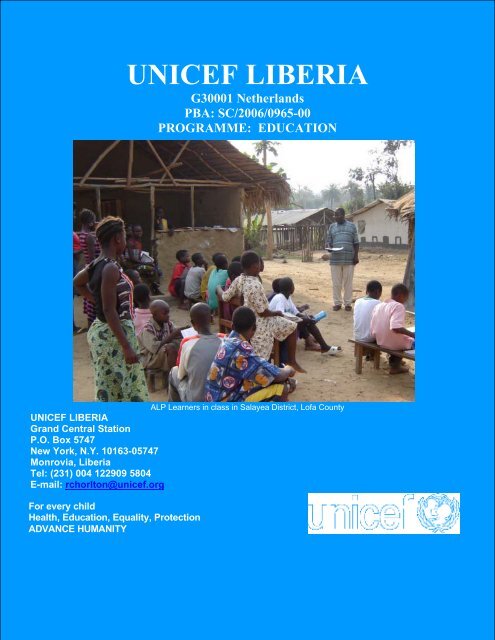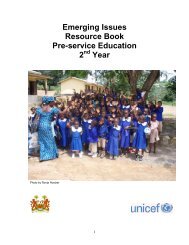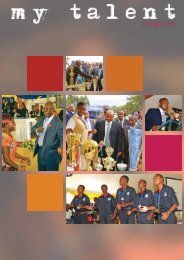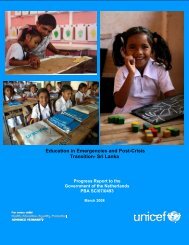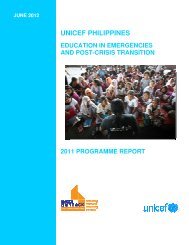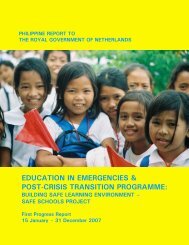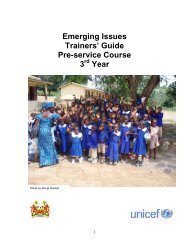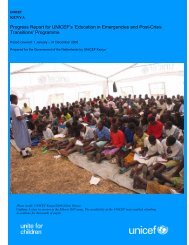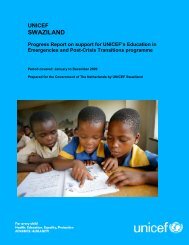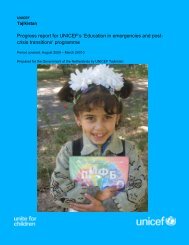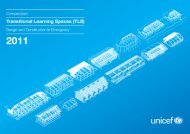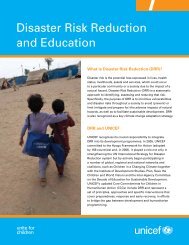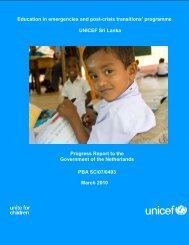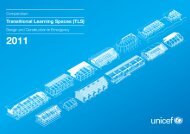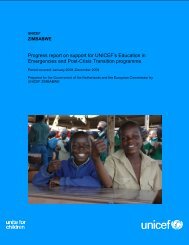Liberia Progress Report 2008
Liberia Progress Report 2008
Liberia Progress Report 2008
- No tags were found...
You also want an ePaper? Increase the reach of your titles
YUMPU automatically turns print PDFs into web optimized ePapers that Google loves.
UNICEF LIBERIA<br />
G30001 Netherlands<br />
PBA: SC/2006/0965-00<br />
PROGRAMME: EDUCATION<br />
ALP Learners in class in Salayea District, Lofa County<br />
UNICEF LIBERIA<br />
Grand Central Station<br />
P.O. Box 5747<br />
New York, N.Y. 10163-05747<br />
Monrovia, <strong>Liberia</strong><br />
Tel: (231) 004 122909 5804<br />
E-mail: rchorlton@unicef.org<br />
For every child<br />
Health, Education, Equality, Protection<br />
ADVANCE HUMANITY
Table of Contents<br />
Map 2<br />
Programme summary 3<br />
I. Executive Summary 4<br />
II, Purpose 4<br />
III. Resources 6<br />
IV. Results 6<br />
V. Future Work Plan 12<br />
VI. Financial Implementation 13<br />
VII. Expression of Thanks 13<br />
1
The Map of <strong>Liberia</strong><br />
2
Programme summary<br />
Country<br />
<strong>Liberia</strong><br />
Program / Project Name<br />
Access to quality basic Education<br />
Donor<br />
Government of the Netherlands<br />
PBA Reference<br />
SM/2006/0965-00<br />
Total Contribution<br />
USD1,886,800.00<br />
Program Amount<br />
USD1,886,800.00<br />
Funds used to date (3) USD 941,035.51<br />
Unspent Balance USD 711,774.65<br />
Duration of Grant 2007-2010<br />
<strong>Report</strong> Type<br />
Annual Donor <strong>Report</strong><br />
<strong>Report</strong>ing Period 15/05/07-31/12/07<br />
<strong>Report</strong> Due Date<br />
31-Mar-08<br />
<strong>Report</strong> prepared on<br />
18-Mar-08<br />
MTSP Organizational Target for<br />
Country<br />
UNICEF 2007 Objective<br />
Geographic Focus area<br />
Focus Population<br />
Program Partners<br />
UNICEF Contact<br />
To restore education rights to all children, especially girls and over aged (10-18 yrs) and to<br />
increase access to quality primary education by 10% in seven focus counties<br />
To restore education rights to all children, especially girls and over aged (10-18 yrs) and to<br />
increase access to quality primary education by 10% in 7 focus counties<br />
7 Counties focus: Bomi, Bong, Grand Gedeh, Maryland ,Montserrado, Nimba, Lofa,<br />
Primary school children, especially girls whose schooling was disrupted by war, teachers,<br />
school administrators, county, district managers<br />
1. The Ministry of Education (MoE)<br />
2. Children Assistance Program (CAP)<br />
3. Community & Human Development Agency (COHDA)<br />
4. University of <strong>Liberia</strong> (UL)<br />
Rozanne Chorlton /Representative / rchorlton@unicef.org Tel: (231) 004 122909 5804<br />
Susan Namondo Ngongi/ Dep. Rep./ sngongi@unicef.org +231- 651-6010<br />
Stella Kaabwe/ Chief of Education / skaabwe@unicef.org +231-655-6723<br />
3
I. EXECUTIVE SUMMARY<br />
<strong>Liberia</strong> is a country in transition from post – conflict to development with the uncertainties that<br />
plague such countries in relation to resources as humanitarian funding declines at the time the<br />
government needs to show that it can restore services to the people. The <strong>Liberia</strong> Partners’ Forum<br />
held in Washington in February 2007 noted the progress made by the new government in<br />
strengthening many aspects of fiscal management for service delivery. However, concern was<br />
raised over accountability, low absorptive capacity and the need to identify appropriate funding<br />
mechanisms for <strong>Liberia</strong> to make progress towards meeting the MDGs relating to women and<br />
children. In 2007 the education programme like the others was related to the MTSP priorities and<br />
to those of the government’s Interim Poverty Reduction Strategy. Thus the one year programme<br />
focussed on improving the quality of teaching and learning and increasing girls’ enrolment and<br />
retention; the accelerated learning programme, and strengthening the overall management of the<br />
education sector.<br />
The contribution from the Netherlands government was used to support this programme. The<br />
flexibility of the fund utilisation allowed UNICEF to support many areas of urgent need in order<br />
get on the path to sustainable education recovery and reform. School supplies were procured and<br />
teachers, school managers trained to effectively manage the system. Much needed data were<br />
collected through the School Census and an Education Management System (EMIS) established<br />
for better planning. With evidence from programming on the ground, UNICEF was better able to<br />
effectively engage in up-stream work and the search for more flexible financing instruments such<br />
as the Pooled Fund for financing education in <strong>Liberia</strong>. The lessons to be learned from this<br />
process have implications beyond education in <strong>Liberia</strong>.<br />
II. Purpose<br />
The purpose of the USD$2,000.000.00 Netherlands government’s funding to the education<br />
programme in <strong>Liberia</strong> in 2007 was to facilitate rapid enrolment and improved quality<br />
through ELP as part of national sector reform process; to include advocacy campaign, CFS<br />
standards, M&E, EMIS reform, studies and reports. The reasons for providing support in so<br />
many areas of education system recovery are many as indicated below.<br />
“Recovering from a long period of war, <strong>Liberia</strong> is still a fragile State in transition from an<br />
emergency relief situation to development” (<strong>Report</strong> of the Joint Executive Boards’ field visit to<br />
<strong>Liberia</strong>, 2007). Fourteen years of conflict devastated the country’s economy, its physical and<br />
human resources. Close to one million people fled from cities, towns and villages to neigbouring<br />
countries of Ghana, Guinea, Sierra Leone, Cote d’Ivoire and Nigeria. Others moved into<br />
Internally Displaced Camps across the country. The challenges facing the government that came<br />
into power in 2006 were still enormous in 2007 as the country’s socio-economic indicators were<br />
among the worst in the world with high unemployment and poverty levels including food<br />
insecurity.<br />
Specifically in relation to the education sector, the long years of civil war and constant instability<br />
decimated the education sector. Over 80% of schools, particularly primary schools, had been<br />
destroyed and by 2006 at least 32 % of the public primary schools were still not available for use,<br />
this in a country where a large proportion of the schools were still being provided by private<br />
agencies for a fee. In the usable public schools, only 26% had safe drinking water and 35% had<br />
latrines, though not in the gender required ratios. Only 24% of the enrolled primary school<br />
children had desks and chairs while many of the classrooms lacked chalkboards, desks or chairs<br />
for the teachers. The primary school learner textbook ratio (of outdated books) was 27:1.<br />
Teachers themselves were in short supply as they too, had fled during the war and those that<br />
4
emained were irregularly paid due to lack of a valid payroll system tied to some form of<br />
qualification. In 2006 over 60% of those teaching had no formal qualifications to teach the level<br />
they were teaching at and probably as a consequence, their salaries remained low at an average of<br />
USD$30.00 per month, forcing many to take additional jobs to supplement their incomes.<br />
The new government that came into power in 2006 embarked on enforcing the Free and<br />
Compulsory School Law in place since 2001. As a result the numerous user fees that were<br />
charged on learners which led many to drop – out of school were eliminated and enrollments<br />
surged, particularly for girls. The government made education a priority in the recovery period<br />
and many refugees made their children’s schooling a condition for their return to <strong>Liberia</strong>. The<br />
large enrolments placed an enormous burden on the weak public primary school system,<br />
undermining any learning gains that were the pull factor in the first place. The revival of the<br />
innovative compressed primary school programme through the Accelerated Learning Programme<br />
(ALP) to cater for older primary school children whose learning was interrupted by the civil war<br />
was becoming ineffective because children, adolescents and young people of all ages and without<br />
any schooling background enrolled. Class sizes swelled to record high while classroom space<br />
remained limited. The barely qualified, poorly paid school teachers were handling huge classes<br />
of learners of different ages, abilities and academic backgrounds. Thus in 2007, 85% of the grade<br />
one learners were aged 8 to 20 as opposed to the official 6 to 7 years (see cover page photo).<br />
In addition to the situation described above, the ministry of education did not have an adequate<br />
budget to provide the promised quality education. Concern was mounting in 2007 that the<br />
promised primary education would become a dubious investment and that many learners would<br />
begin to drop out and create insecurities particularly in the cities where many had returned to.<br />
This would endanger the fragile peace prevailing so far. It was clear that without much external<br />
assistance to the education sector to start re-building the system, the movement from emergency<br />
relief to long term planning for education development would be difficult and education recovery<br />
illusive. The need for long term strategic planning and education financing was seen as critical<br />
and efforts to obtain resources to do this began in earnest in early 2007 with the development of<br />
the <strong>Liberia</strong>n Primary Education Recovery Programme (LPERP 2007 – 2010).<br />
<strong>Liberia</strong> was therefore a prime candidate for financing within the programme addressing education<br />
in emergencies and post-crisis transition countries. The overall goal of this pgramme is “to put<br />
education in emergency and post-crisis transition countries on a viable path of sustainable<br />
progress towards quality basic education for all”. The Netherlands funding to the education<br />
programme in <strong>Liberia</strong> is intended to meet almost all the objectives for which this funding<br />
programme was created, but more specifically the following:<br />
‣ To improve quality of the education response in a post – crisis transition situation;<br />
‣ To increase the resilience of the education service delivery in order to reduce the risk of<br />
slippage and promote “turnaround”;<br />
‣ To promote evidence – based policies, efficient operational strategies and fit for purpose<br />
financing instruments for education in emergency and post crisis situations.<br />
With so many programme objectives, the Netherlands government’s funding is clearly meant to<br />
be flexible in support of macro – processes in education development. The funding to the<br />
education programme supported the implementation of the one year Country Programme/Annual<br />
Work Plan of 2007 whose purpose was to “restore education rights to all children, especially girls<br />
and those who missed out on schooling due to war and are above the primary school age; and to<br />
increase access to quality primary education.” The programme concentrated on these two<br />
components which are also the key themes in the <strong>Liberia</strong>n Primary Education Recovery<br />
5
Programme (LPERP). Accordingly, the programme implemented two projects: Access to Quality<br />
Basic Education, and Access to Accelerated Learning Programme (ALP). Project<br />
implementation would therefore contribute to achieving the MDG 2 (Universal Primary<br />
Education) and MDG 3 (Gender Equality in Basic Education); it was in line with the UNDAF<br />
outcomes 4 (improving education with an emphasis on increased learning achievement) aligned<br />
to the goals of the Interim Poverty Reduction Strategy.<br />
The main implementing partners were:<br />
‣ Ministry of Education (MOE) as the key partner<br />
‣ University of <strong>Liberia</strong> (UL)<br />
‣ Children Assistance Programme (CAP)<br />
‣ Community & Human Development Agency (CODA)<br />
III. Resources<br />
The financial contribution from the Netherlands is shown in the table below with a smaller table<br />
showing utilisation for the period covered by the report.<br />
CONTRIBUTION DATA<br />
Final <strong>Report</strong><br />
Donor Reference<br />
G30001 Netherlands<br />
Assisted Country<br />
<strong>Liberia</strong><br />
Assisted Programme<br />
Education<br />
PBA No.<br />
SM/2006/0965-00<br />
Total Contribution Pledge Amount USD 1,886,800.00<br />
Programmable Amount USD 1,886,800.00<br />
Funds used to-date USD 941,035.51<br />
Balance of Funds Available USD 711,774.65<br />
Duration of Contribution USD 2007-2010<br />
Period covered by <strong>Report</strong> 15/05/07-31/12/07<br />
Date prepared 18 March <strong>2008</strong><br />
Summary Utilisation table of Contribution<br />
A summary of the Utilisation of the funding is shown in the table below.<br />
Total contribution USD 1,886,800.00<br />
2007 Total utilisation in this report USD 941,035.51<br />
Remaining balance USD 711,774.65<br />
IV. Results<br />
The contribution from the Netherlands allowed UNICEF to contribute to the achievement of<br />
national and global goals as translated into the one country programme that was implemented as<br />
indicated above. The main activities and achieved results are described below as well as a brief<br />
mention of the constraints.<br />
6
Activities<br />
Increasing Access to quality Basic Education/Expansion /Intensification of service delivery<br />
The contribution supported activities related to the implementation of the Accelerated Learning<br />
Programme (ALP). This programme compresses the six – year primary school cycle into three<br />
and is intended for older than primary school aged children whose schooling was disrupted by<br />
the war. In 2007 the programme was implemented in 11 of the 15 Counties in <strong>Liberia</strong> by many<br />
partners with UNICEF supporting the largest number in public primary schools. The table below<br />
shows the ALP implementing partners and number of schools /learners supported.<br />
ALP Implementing Partners 2006-2007<br />
Implementing<br />
Partners # Students # of Sch. # Counties<br />
Children's Assistance<br />
Program (CAP) 8,063 64 4<br />
Community and Human<br />
Development Agency<br />
(COHDA) 23,367 134 3<br />
Save the Children UK<br />
(SC - UK) 2,239 23 3<br />
Creative Associates<br />
(CAII) 9,031 106 6<br />
Norwegian Refugee<br />
Council (NRC) 3,958 73 3<br />
Vision IN Action (VIA) 678 10 2<br />
Names of<br />
Counties<br />
Grand Gedeh,<br />
Maryland, Bomi,<br />
&<br />
Montserrado<br />
Nimba, Lofa &<br />
Bong<br />
Bong, Grand<br />
Gedeh,<br />
& Montserrado<br />
Maryland, Grand<br />
Gedeh<br />
Nimba, Lofa,<br />
Bong, &<br />
Montserrado<br />
Bomi, Grand<br />
Capemount,<br />
Gbarpolu<br />
Montserrado &<br />
Margibi<br />
Comment<br />
UNICEF /<br />
MOE<br />
Supported<br />
UNICEF /<br />
MOE<br />
Supported<br />
Monrovia Consolidated<br />
Schools System (MCSS) 305 1 1 Montserrado<br />
Lutheran Church of<br />
<strong>Liberia</strong> School System<br />
(LCLSS) 579 6 3<br />
Nimba, Bong,<br />
Lofa, &<br />
Montserrado<br />
Grand Gedeh,<br />
Maryland, River<br />
Gee & Grand<br />
Kru<br />
IBIS 2,967 62 4<br />
The International Rescue<br />
Committee (IRC) 2,510 20 2 Nimba & Lofa<br />
Total 53,697 499<br />
7
Activities included procuring learning materials for all the ALP and formal school learners; some<br />
of the materials are to be distributed in <strong>2008</strong>. At least 140,000 Level I ALP and Grade I formal<br />
school learners will receive learners’ kit comprising the following:<br />
‣ A branded book bag (MOE/UNICEF logos)<br />
‣ 10 exercise books<br />
‣ 3 Supplementary Readers<br />
‣ 2 Pencils, 2 pens, one ruler, 2 sharpeners, 2 erasers<br />
These materials are essential for first time learners for whom such materials are often a barrier to<br />
accessing the now free primary school education in <strong>Liberia</strong>.<br />
Some recreational materials were also delivered to ALP learners in schools that did not receive<br />
them before. Given the transportation difficulties due poor road infrastructure and long rainy<br />
season in <strong>Liberia</strong>, the funds were used to engage and pay two logisticians to ensure effective<br />
transportation and distribution of school supplies during the dry season. These logisticians also<br />
facilitated end-user monitoring of distributed supplies to minimise leakage and sale of learning<br />
materials to private schools that can afford to pay for them.<br />
The funds also supported activities in policy dialogue and capacity strengthening for ministry of<br />
education policy makers and implementers at the level of minister, deputies and assistant<br />
ministers to participate in a conference discussing strategies to implement the school fee<br />
abolition, an initiative supported by UNICEF and the World Bank. As a result of this and other<br />
guidance given in this area, the MOE is piloting a formula based School Grant system similar to<br />
a Capitation Grant. The funds are being used to provide technical assistance to MOE in policy<br />
analysis to be able to work effectively within the Sector – Wide Approach to policy/planning and<br />
programming in line with the new aid architecture. Conceptualising the grant system is part of<br />
his deliverables.<br />
Lack of accurate and valid data hampers effective planning. The MOE started collecting,<br />
analysing and managing data using a School Census approach in 2006. These data then<br />
constitute the Education Management System (EMIS) which in future will link to other child<br />
welfare indicators to facilitate planning. Lessons learned from the 2006 School Census were<br />
used to improve the process in 2007. The Netherlands contribution was used to support the<br />
conduct of the School Census nation wide, to clean up, code and analyse the data for entry into<br />
the EMIS. A national officer at the MOE who was trained in data entry and management at<br />
UNICEF was supported to provide technical advice in establishing and operationalising the<br />
EMIS at Moe and was the key person in training and supervising the enumerators who conducted<br />
the School Census in October 2007.<br />
As a result, a much more valid data collection process was carried out and the data are being<br />
used to inform current planning for schools, teachers, school, county and district managers and<br />
school supplies provision. The data are informing MOE planning on the number and condition<br />
of schools including those that need repair or replacement. Thus the rate at which quality<br />
education is being restored is revealed by the School Census report. A significant achievement<br />
in the 2007 census was the inclusion of a form to collect data specifically on ALP implementing<br />
schools, their learners and available resources to be able to better plan and implement this<br />
programme. In addition, data were collected on early childhood education provision as well as<br />
provision of education for children with disabilities. When the report is finally published, the<br />
MOE will have a clearer picture of the status of the education system than before. Effective<br />
planning requires such data.<br />
8
Other areas of service delivery included provision of 40 Motorcycles and helmets to enable<br />
District Education Officers (DEOs) monitor / supervise schools through effective visits to schools<br />
in their Districts. In addition, one County Education Office was renovated and a warehouse<br />
constructed in Montserrado County. Given that Montserrado is one of the counties with the<br />
largest number of school children in <strong>Liberia</strong>, a functioning county education office which<br />
includes a well, water tank and pump, a generator house and generator will allow the county to be<br />
effectively managed. The office complex includes a conference / seminar room which can be<br />
used for training and workshops for education managers within the county. The warehouse will<br />
store school supplies prior to distribution and minimise payment of storage charges at the Port.<br />
Capacity development and capacity cultivation<br />
The contribution from the Netherlands was used to provide capacity development in the form of<br />
teacher training and indirectly by attaching a technical assistant to the MOE to support them to<br />
effectively engage in the required policy dialogue and establishing of an innovative fit – for<br />
purpose financing mechanism for the recovery of the education system. Thus:<br />
‣ With the Netherlands funds, at least 250 primary school teachers (from Margibi, Grand<br />
Bassa, Bong, and Nimba counties) received training to “C Certificate’’ level. This is the<br />
formal qualification required to teach at primary school level in <strong>Liberia</strong>. To be certified<br />
to this level the candidate should have graduated from high school and then undergone<br />
teacher training. The teacher training conducted during this period of transition consisted<br />
of 12 weeks of intensive pre-service teacher training. The training emphasised<br />
interactive child – cantered teaching approaches in teaching numeracy, literacy,<br />
fundamentals of science, and taught creative methods of designing free learning tools in<br />
the classroom using locally available natural materials. The approach proved extremely<br />
popular with teachers and was seen as a model to be emulated in formal teacher training.<br />
The teacher training also included vital information on how to address the psychosocial<br />
needs of students who have experienced long periods of conflict and psycho-trauma; it<br />
covered introduction to ALP Teaching Methodology, and Life Skills;<br />
‣ Additionally, 882 teachers from 7 counties (Montserrado, Bomi, Bong, Lofa,<br />
Maryland, Nimba and Grand Gedeh) received training in Accelerated Learning<br />
Program (ALP) Refresher Method and Life Skills. This training has proved<br />
effective for both learners and teachers and is as a result attracting many young<br />
learners who drop out of formal schooling and enrol into ALP. Others participate<br />
in both formal schooling and ALP for the same reason. Although the ALP<br />
teacher training is not certified by MOE, many teachers have found this refreshing<br />
particularly in the absence of continuing teacher education programme from the<br />
ministry. An assessment of the ALP in 2007 found that many of the ALP teachers<br />
were making a big difference in the learning of their students in the absence of<br />
other resources. The training allows teachers to cope with teaching older students<br />
in make shift classrooms. Since UNICEF supported ALP schools only work with<br />
such trained teachers who also get an additional incentive pay on top of their<br />
salaries, the assessment found that the ALP teaching served to retain many<br />
teachers in the system. Formal school teaching is a pre-condition for ALP training<br />
and subsequent ALP teaching. Teaching in this programme keeps them focused<br />
on the business of teaching rather than engage in other income generating<br />
activities which sometimes take teachers away from the classroom.<br />
9
Generating knowledge and building models<br />
<strong>Liberia</strong> was admitted to the FTI Partnership in April 2007 with funding assured in May for the<br />
next two years within FTI framework. In order for MOE to adhere to the FTI principles within<br />
the New Aid Environment, the funds were used to pay for a technical assistant to support the<br />
MOE to meet the requirements for accessing the pledged funds. This technical support of the<br />
Pooled Fund / Financial Management advisor was instrumental in ensuring that MOE meet the<br />
deadlines for developing the many documents relating to the establishing of the fund. As a result,<br />
<strong>Liberia</strong> is providing a test case for establishing a fit for – purpose flexible financing model which<br />
will not only allow the MOE to reform the education system but will easily evolve into a Direct<br />
/General Budget Support (D/GBS) minimising the transaction costs that project funding exerts on<br />
government ministries.<br />
Programme achievements using the Netherlands and other contributions:<br />
# of<br />
Activity<br />
# of<br />
schools<br />
# of<br />
students<br />
trained<br />
Primary<br />
schools<br />
Teachers<br />
# of ALP<br />
trained<br />
teachers<br />
#school<br />
administ<br />
rators<br />
trained<br />
# of<br />
males<br />
# of<br />
Females<br />
# of schools<br />
implementing ALP 449 x x x x x x<br />
# of ALP students 53,697 x x x 28,935 24,762<br />
Level 111 ALP Student<br />
sitting West African<br />
Exams with UNICEF<br />
support<br />
198 7,280 x x x x x<br />
Training of Primary<br />
school teachers. x 550 x x 220 330<br />
Establishment of Girls’<br />
Education Unit in MOE x x x x x x x<br />
ALP refreshers training x x 1,399 x x x x<br />
Training of school,<br />
district, county<br />
administrators/managers<br />
x x x x 1,500 x x<br />
Provision of essential<br />
learning and teaching<br />
materials(3 seated desk,<br />
microscope, dictionaries,<br />
school bags,<br />
Supplementary readers,<br />
chalkboard, 2,545 140,000 x x x x x<br />
Recreational Kits 200<br />
Support to the<br />
Development of the<br />
Education management<br />
Information System<br />
(EMIS)<br />
Technical support in<br />
areas of financial<br />
management at the<br />
Ministry of Education<br />
(TA)<br />
Renovation/construction<br />
of CEO offices and<br />
construction of 4<br />
warehouses<br />
10
Constraints<br />
The Netherlands funding to the education programme in <strong>Liberia</strong> represents the most flexible<br />
contribution that the programme has received in the recent past. This is reflected in the extent to<br />
which the funds were used to supplement contributions from other donors that are more<br />
restrictive and specific for what activities should be supported (as is seen in the programme<br />
achievements table). The 50% utilisation reflected in this report is due to the fact that although<br />
the funds were allocated to the country office in January 2007, they were only actually received<br />
in May 2007 (due to some internal system problems). This was therefore at the beginning of the<br />
heavy rainy season that ends in November, making programme implementation difficult. It also<br />
reflects the number of activities shown as ongoing in this quarter as they were not completed<br />
during the reporting period. For example, the learners’ kits were procured in 2007 but only<br />
arrived this year and distribution is to start soon. The learners’ chairs/desks were to be<br />
manufactured in 2007 but delays in the MOE’s chair design meant that other funds were used for<br />
those already on order so that the Netherlands contribution is being used for the new modular<br />
design whose production is to start shortly after the bidding process completed in <strong>2008</strong>.<br />
In the brief report provided prior to the Annual Review Seminar in November 2007, we had<br />
planned on activities using an estimated budget of USD$8,999,947.00 With the given allocation,<br />
the funding gap was estimated at USD$7,113,147.00. However, with the establishment of the<br />
Pooled Fund with UNICEF as the lead financing partner using the contribution from the<br />
Netherlands, the largest amount is now going directly into the Pool, rather than to the UNICEF<br />
<strong>Liberia</strong> education programme within the country programme of cooperation. This is as it should<br />
be and it is hoped that the impact from this allocation will be greater than if the funds were<br />
utilised using the normal UNICEF procedures. However, there are some constraints associated<br />
with this.<br />
One is that engaging in effective upstream work is time – consuming, requiring numerous inputs<br />
into dialogue for advocacy and implementation of agreed strategies/programmes. Time spent on<br />
these macro – processes delayed internal programme activities as many of the upstream work<br />
activities (preparation of documents for the EFA/FTI submission; subsequently for the<br />
establishment of the Pooled Fund and attendant dialogue mechanism (SWAp)) had deadlines.<br />
The UNICEF <strong>Liberia</strong> education programme lacks enough technical staff to be able to effectively<br />
support the larger macro-processes which have impact on the MDGs and at the same time pilot<br />
viable solutions to inform policy at the national level. It is for this reason that the Netherlands<br />
contribution is being used to fund a post (Education Specialist) to focus on programming for the<br />
two areas of urgent focus in line with our mandate – girls’ education to make progress in gender<br />
equality, and non-formal education (NFE) to clear the backlog of older learners currently enrolled<br />
in primary schools, preventing the country from attaining a respectable Net Enrolment Ratio<br />
(currently at 25%) at primary school. Funds will also be used to document lessons learned from<br />
the establishment of the transitional funding mechanism/the Pooled fund for education support in<br />
<strong>Liberia</strong>. This is essential as the <strong>Liberia</strong> country office does not have a monitoring and evaluation<br />
specialist to assist the programme in such work.<br />
Programme implementation in <strong>Liberia</strong> is complex due to the bad road conditions and heavy<br />
rainfall most of the year. Many of the schools are unreachable by truck or small van making it<br />
difficult to deliver large quantities of bulky supplies as this requires communities to physically<br />
carry them to schools. This in turn makes record keeping difficult as supplies reach schools at<br />
different times and in varying quantities than planned. The support for a strong procurement/<br />
11
supply management system within MOE that is to be established using the Netherlands funds<br />
through the Pooled Fund should lessen the need for UNICEF to deliver supplies as MOE will be<br />
able to manage the distribution. UNICEF’s role will remain in end – user monitoring.<br />
FUTURE WORK PLAN<br />
Activities<br />
Distribute teaching and Learning<br />
Materials to 140,000 children in formal<br />
and ALP implementing Schools<br />
Q<br />
1<br />
Time Frame<br />
Q Q Q<br />
2 3 4<br />
X X X<br />
Planned Output<br />
Teaching and Learning Materials distributed to<br />
140,000 children in formal and ALP<br />
implementing Schools<br />
Renovation of 100 primary Schools X X X 100 primary schools renovated<br />
Provide Science Kit for 200 ALP<br />
Science Kit for 200 ALP Schools provided<br />
Schools X X X<br />
Provide Recreation Kits for 100 ALP<br />
implementing schools<br />
Recreation Kits provided for 100 ALP<br />
implementing schools<br />
Provide furniture for 20,000 students X X X X furniture for 20,000 students provided<br />
Purchasing of supplementary readers for<br />
100,000 students in 1,000 primary<br />
schools<br />
Construction of 5 warehouses in 5<br />
Counties<br />
Provide capacity for<br />
monitoring/supervision through<br />
effective visits to schools, districts<br />
counties through management training<br />
With MoE and other partners, support<br />
the development of minimum quality<br />
package for 150,000 primary school<br />
children publicize, implement and<br />
monitor utilization<br />
Support MOE to define components and<br />
develop the School Fee Abolition<br />
Policy<br />
Through TA and training, contribute to<br />
MoE capacity for policy analysis,<br />
planning, budgeting and continued<br />
support to School Census for EMIS<br />
Support recruitment / training of master<br />
X X X X supplementary readers for 10,000 students in<br />
1,000 primary schools<br />
X X X X 5 warehouses in 5 Counties in 5 counties<br />
constructed<br />
Logistics-40 motor cycles provided &<br />
X X X supervisory training provided to schools CEO’s<br />
and DEOS<br />
X X X X Minimum quality package for 150,000 primary<br />
school children implemented and monitored<br />
X<br />
X<br />
School Fees Abolition Policy developed<br />
X X X Policies, plans, budget developed; School Census<br />
conducted, report entered into EMIS<br />
trainers especially women X X X Increase number of Master trainers<br />
Provide latrines water points & hand<br />
wash facilities X X X<br />
latrines water points & hand wash facilities<br />
provided in primary schools<br />
Train SMCs/PTAs to maintained<br />
SMCs/PTAs trained to maintained WASH<br />
WASH facilities X X facilities<br />
Establish Child to Child hygiene<br />
education clubs, monitor performance X X<br />
hygiene education clubs, and performance<br />
monitored<br />
Project support X X X X Support for logistic provided<br />
12
FINANCIAL IMPLEMENTATION:<br />
The Cognos report is attached for details of fund utilisation for PBA SC/2006/0965-00.<br />
EXPRESSION OF THANKS<br />
UNICEF <strong>Liberia</strong> wishes to acknowledge with thanks the generous contribution of the Netherlands<br />
Government to the Education programme. As a result of the contribution, progress is being made<br />
towards restoring the right to education for many children whose schooling was interrupted by the<br />
civil conflict. The significant contribution to the Government of <strong>Liberia</strong> through UNICEF to<br />
establish a Pooled Fund for education will provide critical lessons in establishing fit for purpose<br />
financing mechanisms that effectively address the challenges of education in post – crisis<br />
transition countries. The funding has made it possible for <strong>Liberia</strong> to serve as a test case for the use<br />
of an alternative funding mechanism to support a country in an unstable context at a time when<br />
this is urgently needed to inspire confidence into a new government to deliver on promises made.<br />
Since the funding is being provided within the principles of the FTI a foundation is being laid for<br />
<strong>Liberia</strong> to access funding from the mainstream of external financing.<br />
13


